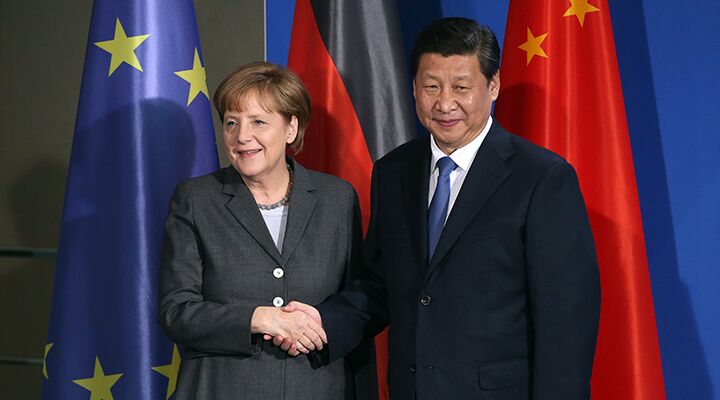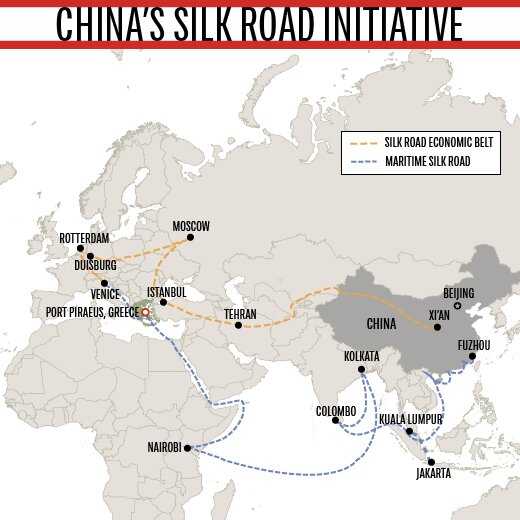
Germany to Work With China on Economic Colonization
China’s global economic colonization is well known; it is buying up access to international resources at a rapid rate. Since 2009, state-owned China Development Bank and the Export-Import Bank of China have loaned more money each year to developing countries than the World Bank has. Between 2004 and 2013, China’s overseas investments rose from $45 billion to $613 billion.
Now, Germany wants to join China.
“[German Chancellor] Angela Merkel and [Chinese President] Xi Jinping are planning a new alliance,” wrote Handelsblatt (June 14; Trumpet translation throughout). “In the future, governments and businesses together will be active in Africa’s or Asia’s third markets.”
Chancellor Merkel conducted her ninth state visit to China from June 12 to 14 for the countries’ fourth annual joint cabinet meeting.
The frequency of these visits alone shows the strong political relations between Germany and China. The two also have a close economic relationship: Nearly half of the European Union’s exports to China come from Germany. During the visit, the two countries signed a business deal worth around $3 billion.
But most important was a new initiative for Germany to work alongside China in its economic colonization. “If we join forces and get active in markets such as Asia or Africa, we can all benefit from our combined strength,” Merkel said.
This was a key theme of her visit. The second chapter of the joint statement produced after the meetings was “Cooperation in Third Countries and on Third Markets.”
The two nations will begin this with a small project in Afghanistan. China and Germany agreed to university-level cooperation on a coal mining project and disaster relief in the country.
“That may seem like a small step, but for China, a country that normally follows strict noninterference policies, it’s a new direction,” wrote Dagmar Engel for Deutsche Welle. “The German-side’s plan is to get China involved and to use its influence—a strategy that already worked in the nuclear talks with Iran.”
Handelsblatt hailed this as “a new fundamental idea for the already dramatically changing cooperation with China.”
Of course, it’s also about money. “Concerning cooperation in third-country markets, Germany’s idea is to include China, use its economic power—and make money,” wrote Engel.
Reuters reported that “German government and industry sources” had told it that “Joint German-Chinese teams could knock competitors out of the running, while helping German firms tap into larger Chinese financial resources …. Financing could be provided through a new Chinese ‘Silk Road Fund’ and the new Asian Investment Bank, they added ….”
The two governments also promised to support cooperation between German industrial giant Siemens and the China Railway Rolling Stock Corp., as well as cooperation between China Railways Group and Deutsche Bahn. These companies, they said, would work together in China and Europe but also in “third countries.”
“That means a market power of entirely new dimensions,” wrote Engel.
As Handelsblatt explained, the benefits to Germany are twofold: It helps German companies avoid competition with China overseas. And it also helps integrate China into existing trading structures and ways of doing business internationally—international norms, which the European Union helped set up and benefits from.
The relationship is not completely harmonious. Germany and China are two of the world’s premier export powerhouses. They have plenty of incentive to compete against each other. But both leaders seem determined to smooth over the conflicts and work together.
One of the Trumpet’s key warnings in recent years has been the emergence of an economic system that does not revolve around the United States. The only way this can happen is if Europe and China cooperate. China’s New Silk Road Initiative is aimed at drawing the economies of China and Europe closer together, as well as drawing the Middle East and Asia closer to China. Trumpet editor in chief Gerald Flurry wrote in 2010 that “the trend of collusion between these two great economic blocs is worth watching.”

If Germany and China follow through on the promises of this summit, it will not only help both nations generate much-needed export business, but also increase their economic involvement across the world. It will help pave the way for the creation of this new economic system. For more on the cooperation between Germany and China, read “The Great Mart.”
